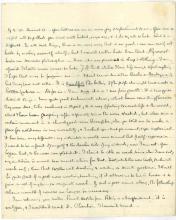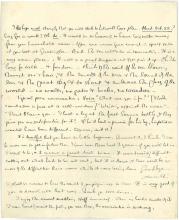BRACERS Record Detail for 18691
To access the original letter, email the Ready Division.
"Dearest O. Your letters are an immense joy and refreshment to me."
There is a transcription of the letter, document .007052-f6, pp. 590-2, record 93487.
Letter 94
BR TO OTTOLINE MORRELL, 4 SEPT. 1918
BRACERS 18691. ALS. Texas. Auto. 2: 94
Previous Brixton letter, BRACERS 19357; next letter, BRACERS 19358
Edited by K. Blackwell, A. Bone, N. Griffin and S. Turcon
<Brixton Prison>1
Sp 4. ’18.
Dearest O. —
Your letters2 are an immense joy and refreshment to me. You are so right not to pollute your soul with hatred, as you say, and I do try not to hate. But it is difficult. In all such things, there is an easy way that is no good: one can easily not hate by making oneself aloof, but I would rather hate than that. My worst hates are towards philosophers — those who are parsons in sheep’s clothing. I am afraid I shall never cease to hate J.A. Smith3 while I have life enough to feel anything. I hope that may be forgiven me. — I don’t remember either Barker4 or Handeyman,5 , a but I may have met either. It is dreadful the killing of the people who might have made a better future. As for me: I am sure it is a “sure firm growth”.6 It is two quite distinct things: some quite good technical ideas, which have come simply because they were due, like cuckoos in April; and a way of feeling towards life and the world, which I have been groping after especially since the war started, but also since a certain moment in a churchyard near Broughton,7 when you told me to make a place for wildness in my morality, and I asked you what you meant, and you explained. It has been very difficult: my instinctive morality was so much that of self-repression. I used to be afraid of myself and the darker side of my instincts; now I am not. You began that, and the war completed it. I shan’t be idle or waste time when I come out; my ambition is much too much alive for that. First, while the war lasts, technical work only; then that together with teaching and writing on social questions.8 I should be quite glad of a post now involving teaching, if it allows me to live in London and to give most of my time to original work. If such a post came along, the fellowship scheme would of course no longer be necessary.
I am returning your books. Pencil sketches from Peking is a disappointment — it is vulgar,9 and I couldn’t read it. Chartism I haven’t read.10
I do hope most strongly that you will stick to Lulworth Cove plan. About Oct. 22?11 Say for a week? Oh do. It would be so heavenly to have long talks away from your household cares. You are never free enough in spirit to be at your best at Garsington. And the sea will be so intoxicating. It is a very warm place. It will be a great disappointment if you give it up. Oh I do long for talk — and freedom — think of the wind off the sea blowing through one’s hair, and the smell of the sea and the sound of the sea and the great sky and to shout and embrace the glory of the world — no walls, no gates and locks, no warders.b
Typical prison conversation: Voice “What are you in for?” [I look round and see a face at a cell-window] “Writing against the war”. “Don’t blame you. I lost a leg at the first Somme battle,12 and they give you no satisfaction for it”. If he’d had a pension for his leg, his politics would have been different. Queer, isn’t it?
It is dreadful that you have so little happiness. Dearest O., I think I can be more use to you in future than I have been these last 2 years — if you will let me. I want to be, and it means a great deal to me. It was terribly difficult cutting out what had to be cut out, but it is done, and there need be no more of the difficulties there were while it was being done. Goodbye.
Your
B.
I shall be curious to hear the result of your pilgrimage to Carr.13 It is very good of you to travel all that way. Thank you 1000 times.
I enjoy the sweet smelling stuff immensely. When my hands smell of it I can hardly resist the feeling you are there, the association is so strong.
- 1
[document] The letter was edited from a digital scan of the initialled, single-sheet original in BR’s hand in the Morrell papers at the University of Texas at Austin. Half of the first paragraph was published in BR’s Autobiography, 2: 94.
- 2
Your letters Here BR replied specifically to Ottoline’s letter of 2 September 1918 (BRACERS 114757).
- 3
I shall never cease to hate J.A. Smith A Balliol College neo-Hegelian and Aristotelian scholar, John Alexander Smith (1863–1939) was Waynflete Professor of Moral and Metaphysical Philosophy at Oxford from 1910 to 1936. He was despised by BR as a “hypocrite and a humbug.... On the pretext of moral improvement of the young, he depraved them by teaching them to believe things which are not true” (quoted in Alan Wood, Bertrand Russell: the Passionate Sceptic [London: Allen & Unwin, 1957], p. 83). BR told two anecdotes against Smith in The Collected Stories of Bertrand Russell, ed. B. Feinberg (London: Allen & Unwin, 1972), pp. 288–9.
- 4
I don’t remember either Barker The Oxford political theorist Ernest Barker (1874–1960) was staying with Henry Bentinck at Underley Hall and helping Ottoline’s brother write a slim volume entitled Tory Democracy (London: Methuen, 1918). Ottoline described him to BR as “a nice fellow but rather stupid and yet very clever” (2 Sept. 1918, BRACERS 114757). Although she considered “his views … advanced”, Barker’s politics were rather cautiously Liberal, and although he was tutoring a Conservative M.P. about his party’s reform tradition, he specialized at this time in ancient Greek political thought. Barker left New College in 1920 to become principal of King’s College, London, a position he held until accepting in 1927 a newly endowed chair in political science at Cambridge. Notwithstanding Barker’s long academic career, BR seems not to have been acquainted with him until they were together on the BBC Brains Trust in 1945; they also joined in signing letters to The Times at the end of that decade.
- 5
or Handeyman John Hay Maitland Hardyman (c.1895–1918) was a Lieutenant-Colonel in the Somerset Light Infantry who was killed in action at Bienvillers, France, on 24 August. For his bravery in combat, commented upon by Ottoline in the letter to which BR was replying (BRACERS 114757), he was posthumously awarded a DSO. Two years previously, Hardyman had published a volume of war poetry entitled A Challenge (London: Allen & Unwin). A disconsolate Ottoline described him to BR as “very brilliant and very pacifist … the sort of man who would have done wonderful things after the War”.
- 6
“sure firm growth” Ottoline had hoped in her letter (BRACERS 114757) that BR’s newly found ambition was “of a sure firm growth”.
- 7
a certain moment in a churchyard near Broughton In the summer of 1912 Ottoline’s husband, Philip, had considered moving his family to Broughton Grange, an Oxfordshire property owned by the Morrells. The couple even lived there for a short time from mid-August, along with Ottoline’s disapproving mother-in-law, who had learned of her affair with BR. Although the circumstances were hardly ideal for illicit romance, BR visited Ottoline several times in Broughton. He was near the height of his passion for her and full of hope for the future of their relationship. Privately, Ottoline did not quite share his ardour or abandon, but must have encouraged his emotional intensity on one of their long country walks (see Miranda Seymour, Ottoline Morrell: Life on the Grand Scale [London: Hodder & Stoughton, 1992], pp. 168–73). In Letter 102 BR responded to Ottoline’s thoughts on the episode.
- 8
teaching and writing on social questions BR had already done a good deal of writing on social questions (see note 5 to Letter 19). As for teaching, he had been engaged to teach the usual symbolic logic but also “Contemporary Ethical Problems” at Harvard in 1916–17 (see 46 in Papers 13); but the government’s seizure of his passport prevented him from taking up the appointment. After the war he did not teach on social questions until he went to China in 1920–21 (see Lianghua Zhou, “A Critical Bibliography of Russell’s Lectures and Addresses in China”, Russell 36 [2016]: 144–62) — notably the course “Science of Social Structure”, which developed into The Prospects of Industrial Civilization (1923).
- 9
Pencil sketches from Peking … is vulgar I.e., A.E. Grantham, Pencil Speakings from Peking (London: Allen & Unwin, 1918), a study of Confucian and Daoist teachings and their influence on Chinese history. Ottoline’s also inaccurate attempt to remember the title was Pencil Jottings from Peking (BRACERS 114757).
- 10
Chartism I haven’t read Ottoline’s most recent letter (2 Sept. 1918, BRACERS 114757) indicates that the book BR neglected was Mark Hovell’s The Chartist Movement (Manchester: Manchester U. P., 1918), completed (with the editorial assistance of T.F. Tout) and published after the author’s death on the Western Front in August 1916.
- 11
Lulworth Cove plan. About Oct. 22? Keenly anticipating this visit to the Dorset coast, BR told Ottoline after his release that he was “counting on Lulworth” (3 Oct. 1918, BRACERS 18698). But she dropped out of the planned trip on 7 October 1918 (BRACERS 114761), and BR ended up going to Lulworth with Colette instead, on 16–19 October. For the first mention of Lulworth, see Letter 89 and note 5 for a map.
- 12
first Somme battle BR’s ex-serviceman fellow convict had almost certainly been wounded in 1916. Enormous casualties were sustained on both sides (perhaps a million in total) in this notoriously attritional “first” Battle of the Somme, which lasted from 1 July until 18 November and ended with only minimal territorial gains for Allied forces, who had expected the German defensive line to crumble completely. In 1918 the Somme River basin in Picardy was the site of two other major battles. German forces attacked across a broad front on 21 March, advanced about 40 miles over the next two weeks, but then failed to seize the strategically vital centres of Amiens and Arras. As BR wrote this letter, Allied forces had just registered a decisive victory in the second Somme battle of 1918, which commenced with coordinated attacks on 21 August and succeeded by 2 September in pushing the Germans back to the Hindenburg Line, from where their dramatic spring offensive had been launched just over five months previously.
- 13
your pilgrimage to Carr On 6 September Ottoline travelled with Gladys Rinder to Wildon Carr’s country home in Amberley, West Sussex. She intended to “stir him up” in support of the fellowship plan, she told BR four days before making this “pilgrimage” (BRACERS 114757).


